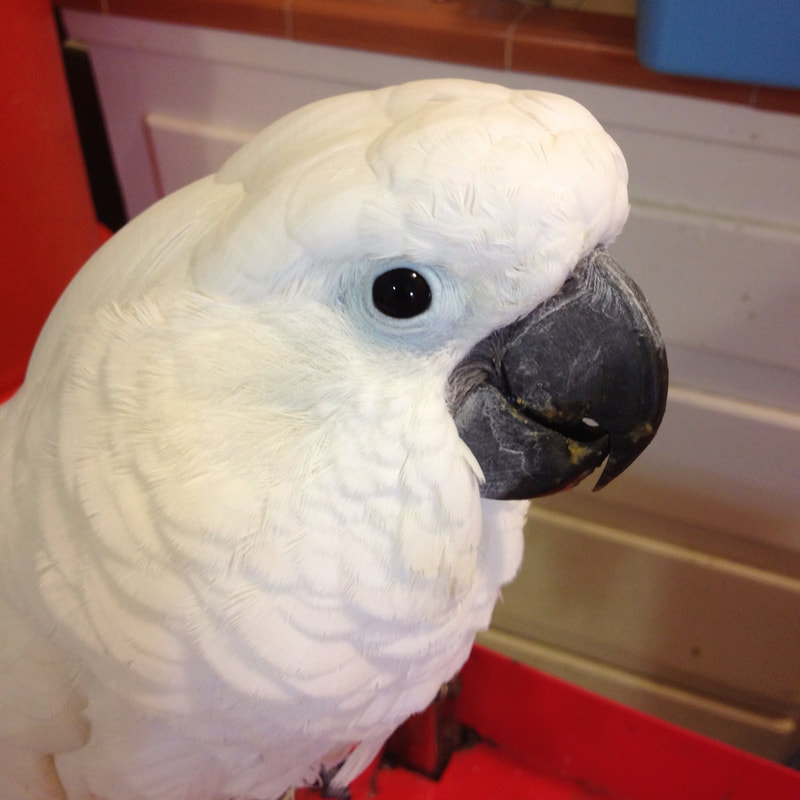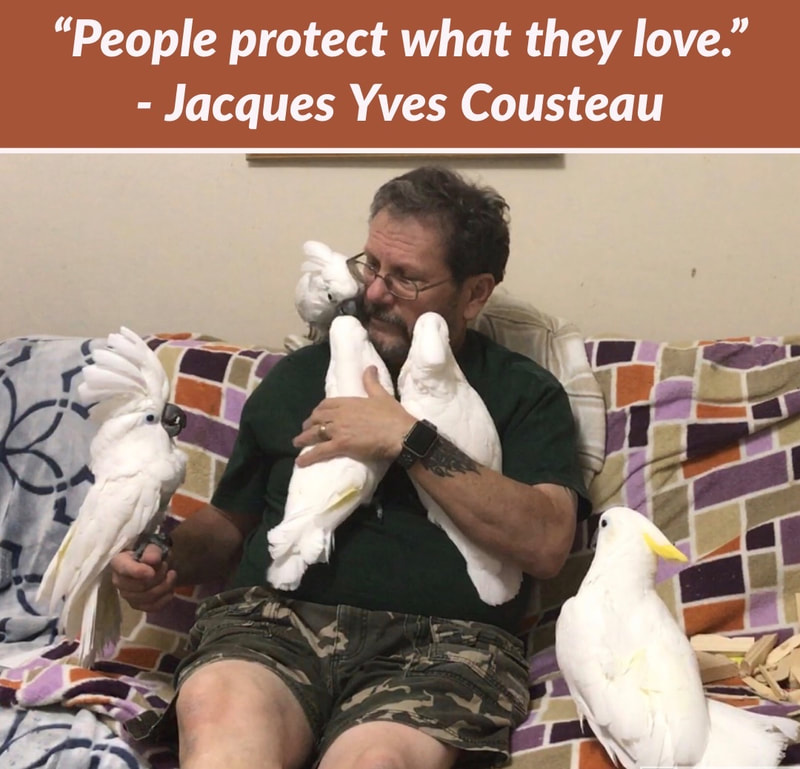The Chloe Sanctuary is here to help you understand parrots and cockatoos, care for your bird, and provide a learning experience for everyone truly interested in wild exotic birds.
Our mission statement:
The Chloe Sanctuary uses proven methods to help physically and emotionally damaged parrots and cockatoos heal, providing them sanctuary for life in an environment tailored to their needs.
With recent estimates of up to 60 million captive psittacines—the larger species living up to 80 years—the need to train caretakers and inform the public is daunting. The average person bringing home a parrot does not realize that these creatures are like a two-year-old with a pair of pliers and a foghorn. Seeing education as the key to protecting these unique creatures, we use educational video productions to inform the public about these exceptional wild animals.
The Chloe Sanctuary uses proven methods to help physically and emotionally damaged parrots and cockatoos heal, providing them sanctuary for life in an environment tailored to their needs.
With recent estimates of up to 60 million captive psittacines—the larger species living up to 80 years—the need to train caretakers and inform the public is daunting. The average person bringing home a parrot does not realize that these creatures are like a two-year-old with a pair of pliers and a foghorn. Seeing education as the key to protecting these unique creatures, we use educational video productions to inform the public about these exceptional wild animals.
A bridge over the river of suffering
A message from the executive director
When you are involved in parrot rescue you see many things: suffering, neurosis and psychosis. Often I see eyes darkened by futility. They have given up. They have reached the point where they would rather die than continue living. Life has become a living hell where the one that they wanted to love has turned into a demon. Because of that demon they become raving, screaming creatures that would do anything to make the pain stop. There is nowhere to turn; they live in a nightmare world.
This is how most people come to us. As rescuer, we naturally take the first paragraph to mean the suffering of birds. No, I am not talking about a parrot being relinquished. I am describing many of the people who turn over their birds to us. Often they are close to mental breakdown. They never dreamt that the sweet-looking, cuddly cockatoo they brought home would turn them into awful, spiteful people who throw things at cages and yell “stop it” at the top of their voices. Often they have abandoned the bird to its cage by then being afraid of another bite. Many times they cover the cage to stop the incessant screaming. Most of them would feel contempt for someone who treated a dog the way they have been treating their bird. In truth, I think most of them feel contempt for themselves. They hate what they have become.
Someday you may have a bird who has crossed over into insanity or is driving you crazy. We may be able to help. We keep our residents for life, giving sanctuary to the heartbroken, abused, unwanted, and downtrodden. Nonetheless, we do what we can to help those in distress. Please contact us if you need guidance or just a shoulder to lean on.
When you are involved in parrot rescue you see many things: suffering, neurosis and psychosis. Often I see eyes darkened by futility. They have given up. They have reached the point where they would rather die than continue living. Life has become a living hell where the one that they wanted to love has turned into a demon. Because of that demon they become raving, screaming creatures that would do anything to make the pain stop. There is nowhere to turn; they live in a nightmare world.
This is how most people come to us. As rescuer, we naturally take the first paragraph to mean the suffering of birds. No, I am not talking about a parrot being relinquished. I am describing many of the people who turn over their birds to us. Often they are close to mental breakdown. They never dreamt that the sweet-looking, cuddly cockatoo they brought home would turn them into awful, spiteful people who throw things at cages and yell “stop it” at the top of their voices. Often they have abandoned the bird to its cage by then being afraid of another bite. Many times they cover the cage to stop the incessant screaming. Most of them would feel contempt for someone who treated a dog the way they have been treating their bird. In truth, I think most of them feel contempt for themselves. They hate what they have become.
Someday you may have a bird who has crossed over into insanity or is driving you crazy. We may be able to help. We keep our residents for life, giving sanctuary to the heartbroken, abused, unwanted, and downtrodden. Nonetheless, we do what we can to help those in distress. Please contact us if you need guidance or just a shoulder to lean on.
What we can do for you:
- Help you decide if a rescue parrot or cockatoo will fit into your life.
- Help you find a local rescue anywhere in the world.
- Help you find a local avian vet and understand the reasons that your parrot needs a specialist.
- Point you to excellent resources to help you prepare for or deal with parrot problems
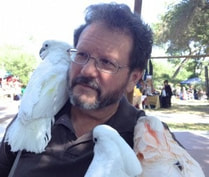 Don Scott, Founder
Don Scott, Founder
The primary focus of The Chloe Sanctuary is education and giving care to abused or psychotic birds. Our project “Get the Word Out” is to help the general public find out more about parrots and to help end the sale of captive exotic avians.
The Chloe Sanctuary, founded in 2008 by our Executive Director Don D. Scott, is an environment where parrots and cockatoos are healed and given lifelong care, volunteers and caretakers are trained, and the public made aware of these exceptional creatures who belong in the wild and not as captive human companions suffering in cages. Using hands-on education and lectures and training seminars we share our knowledge of these wild animals and work to help the public to understand the severity of the problems associated with allowing captive exotic animals in private homes.
The Chloe Sanctuary, founded in 2008 by our Executive Director Don D. Scott, is an environment where parrots and cockatoos are healed and given lifelong care, volunteers and caretakers are trained, and the public made aware of these exceptional creatures who belong in the wild and not as captive human companions suffering in cages. Using hands-on education and lectures and training seminars we share our knowledge of these wild animals and work to help the public to understand the severity of the problems associated with allowing captive exotic animals in private homes.
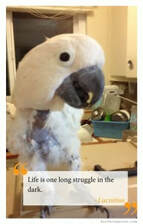 Sugar the day she arrived
Sugar the day she arrived
Our birds serve as educators and ambassadors when healed enough to be brought to our events, and their loud voices and demanding behavior make clear what words alone cannot. We explain how their constant screams, their powerful bites, or self-mutilation drove their owners to abandon them. These abnormal behavior all stem from improper handling by the untrained caretaker.
Don Scott, our founder and executive director, graduated with excellence from the LLA professional course in Applied Behavior Analysis in 2008, taught by Dr. Susan G. Friedman, Ph.D., who pioneered ABA with captive animals. Mr. Scott leads our online Avian Tutor program, our onsite workshops, and our video production team.
Don Scott, our founder and executive director, graduated with excellence from the LLA professional course in Applied Behavior Analysis in 2008, taught by Dr. Susan G. Friedman, Ph.D., who pioneered ABA with captive animals. Mr. Scott leads our online Avian Tutor program, our onsite workshops, and our video production team.
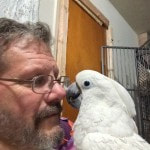
Dr Jeffrey Jenkins DVM, on our board of directors, is internationally recognized for his work in avian medicine and surgery, exotic and laboratory animal medicine and surgery. He has lectured nationally and internationally, his works appear in peer reviewed journals, texts and monographs. He holds Diplomate status in the American Board of Veterinary Practitioners in Avian Practice. He is one of the first of twenty veterinarians to achieve this honor.
Dr. Lee Young, DVM, a clinical veterinarian with a degree in biomedical science, works closely with our captive collection.
Dr. Lee Young, DVM, a clinical veterinarian with a degree in biomedical science, works closely with our captive collection.
If you have questions about parrots and cockatoos, check us out on Facebook or YouTube.
